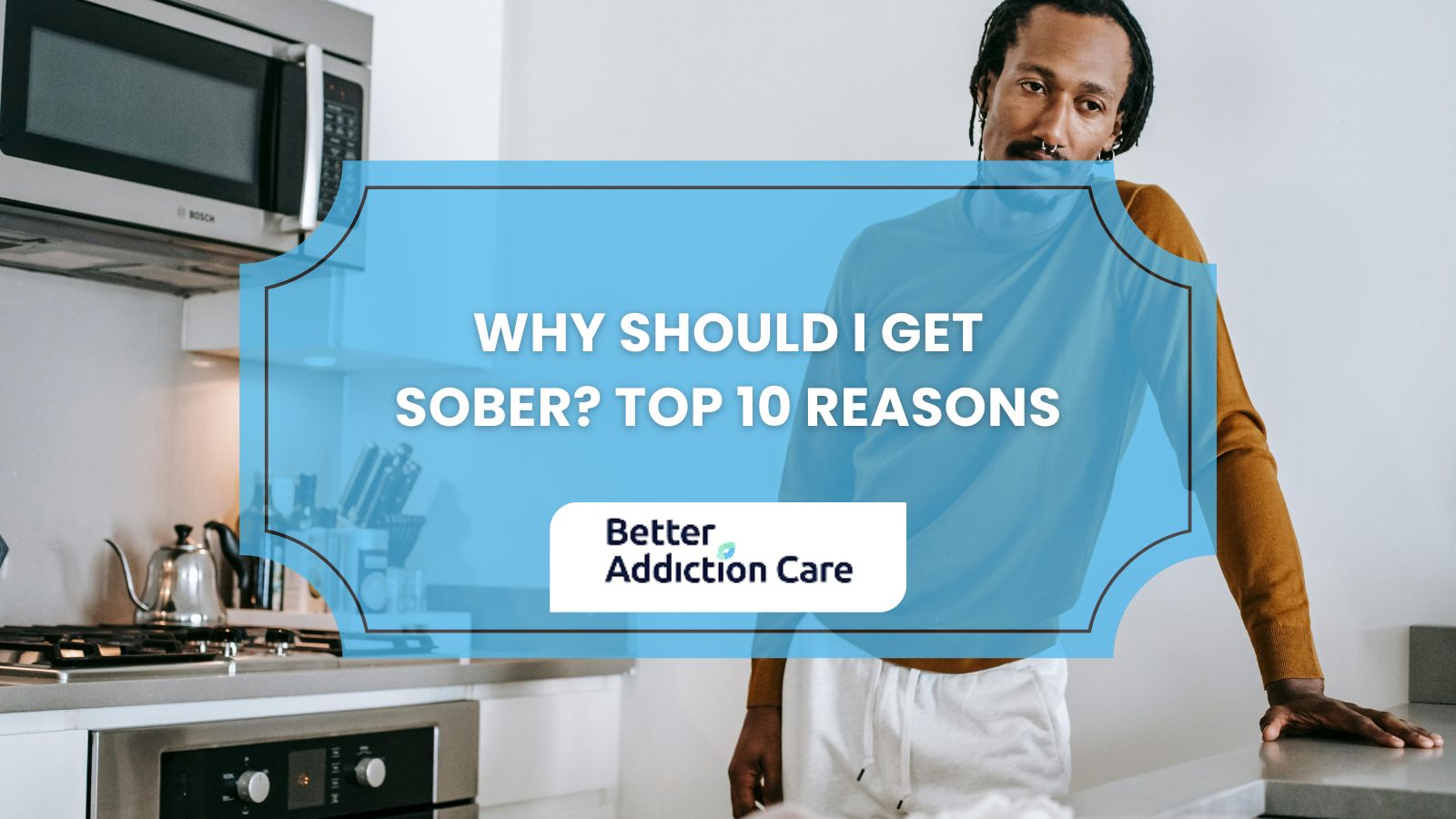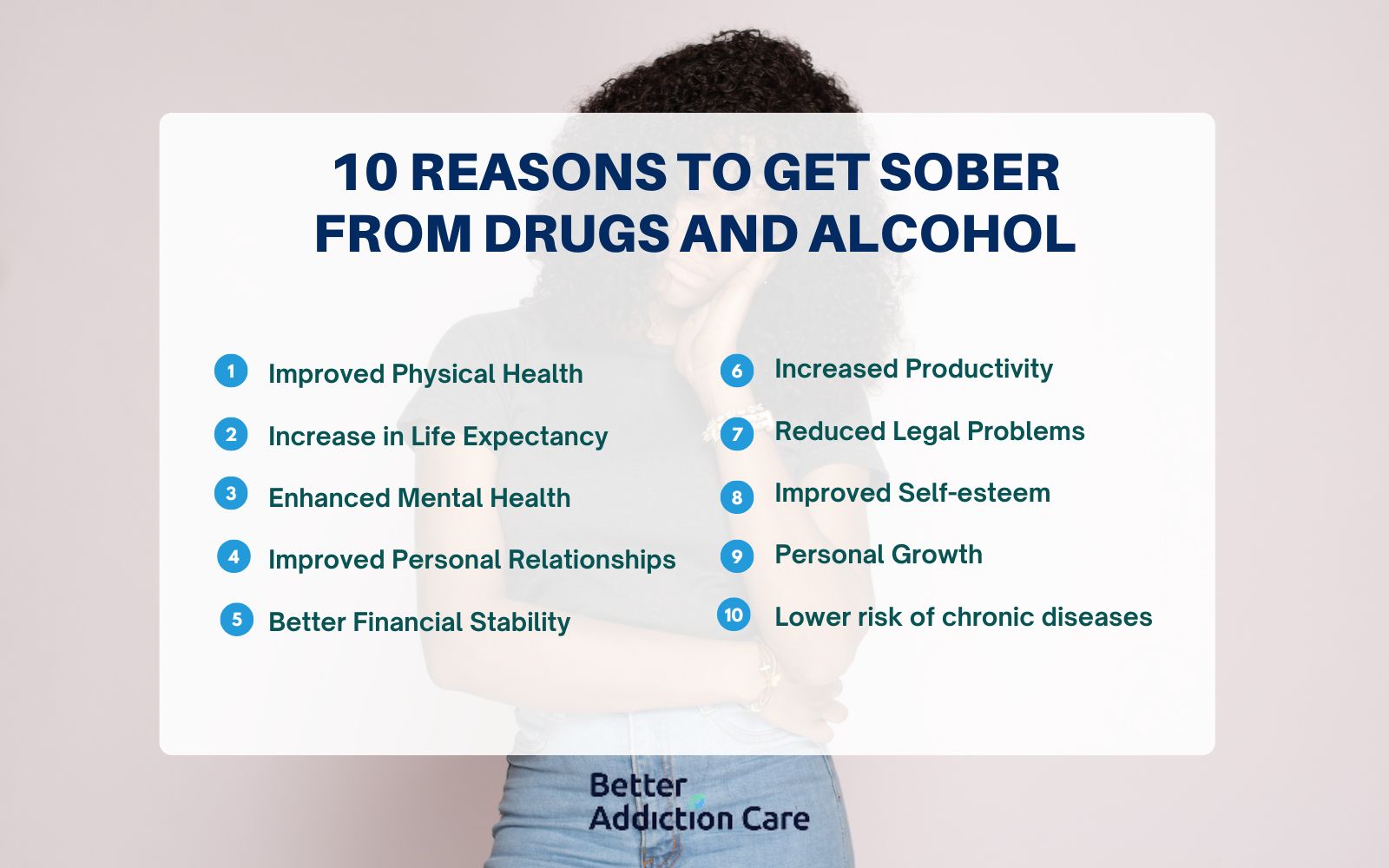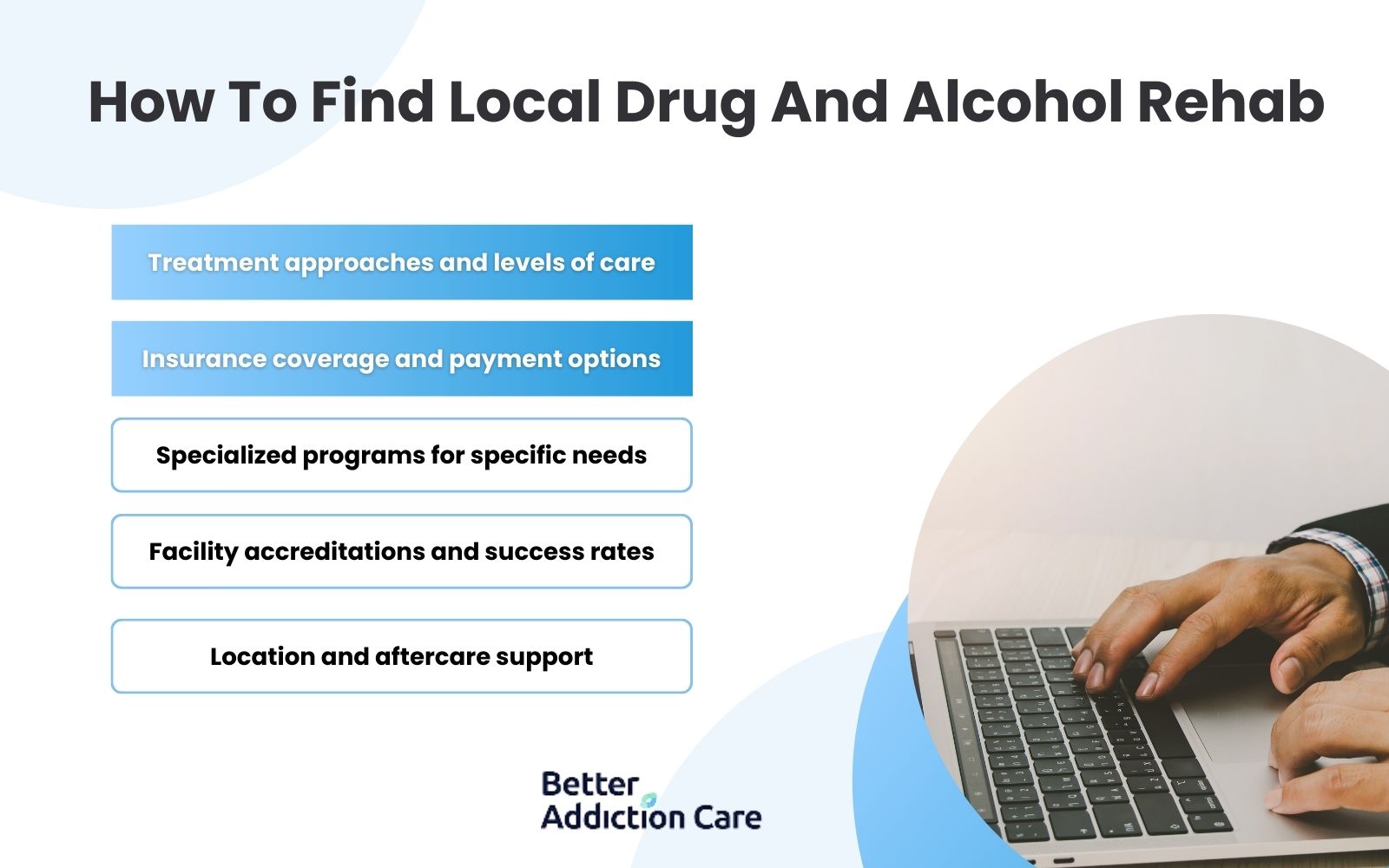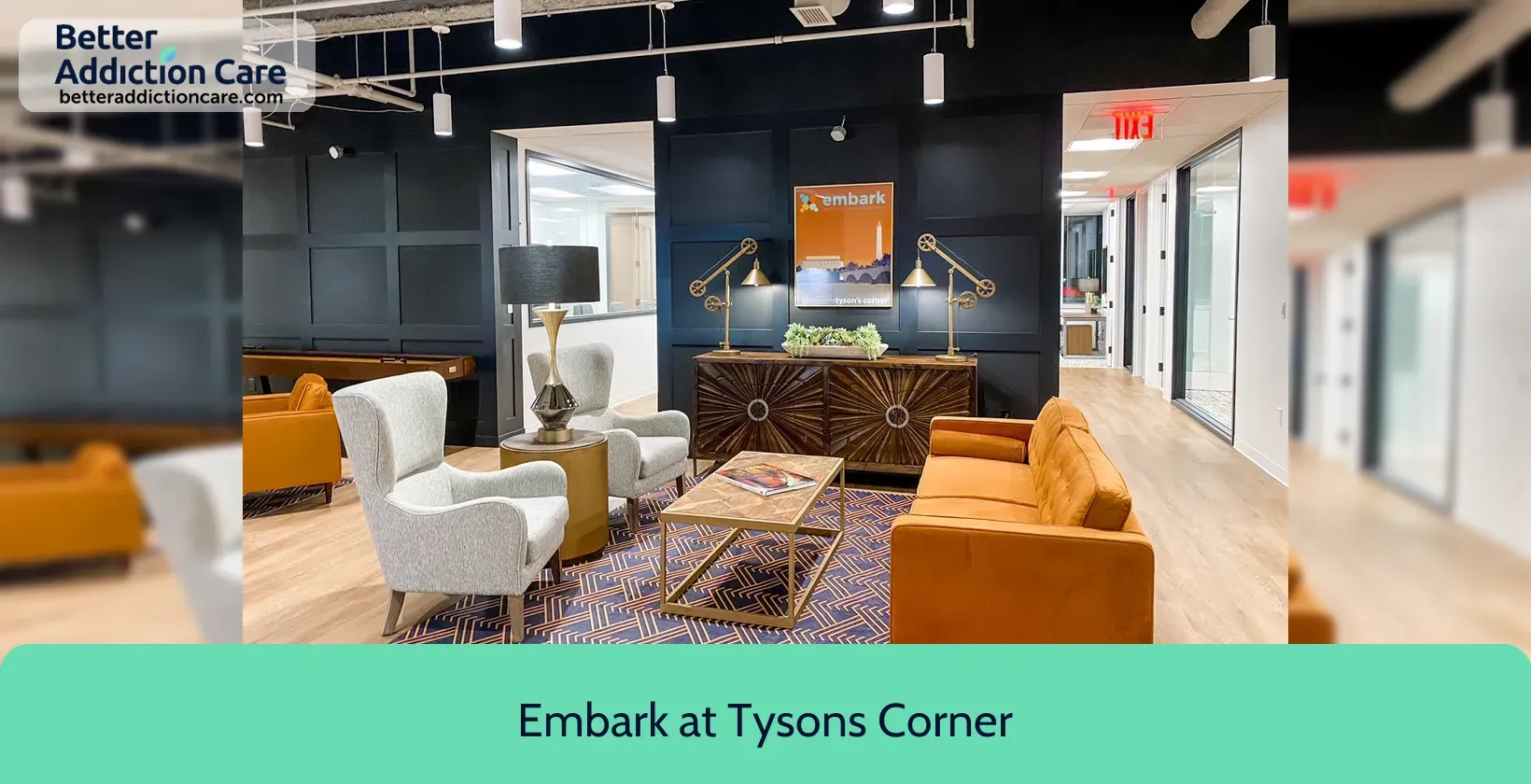Why Should I Get Sober? The Top 10 Reasons

You should get sober to improve your physical health. Sobriety leads to increased life expectancy, enhanced mental health, strengthened personal relationships, and better financial stability. Productivity and success increase with sobriety, and legal problems decrease with sobriety. Self-esteem and confidence improve during sobriety, and personal growth and self-discovery happen in sobriety. Sobriety lowers the risk of chronic diseases.
According to Hagen, E.’s 2017 study, ‘One-year sobriety improves satisfaction with life, executive functions and psychological distress among patients with polysubstance use disorder.’, One year of sobriety significantly improves well-being for individuals with polysubstance use disorder. Abstinent individuals see increased life satisfaction, improved executive function, and a 50% reduction in psychological distress. These results, statistically significant (p<0.001), show that sustained abstinence leads to meaningful recovery in cognition, emotional health, and quality of life.
What Are The Reasons to Get Sober from Drugs and Alcohol?

The reasons to get sober from drugs and alcohol include improving physical health, increasing life expectancy, enhancing mental health, strengthening personal relationships, achieving better financial stability, boosting productivity and success in work and school, reducing legal problems, improving self-esteem and confidence, fostering personal growth and self-discovery, and lowering the risk of chronic diseases.
Here are the 10 reasons to get sober from drugs and alcohol:
1. Improved Physical Health
Sobriety significantly improves physical health, including reduced risk of liver damage, heart disease, and immune system suppression. Sobriety also enhances sleep quality, energy levels, and overall physical functioning, allowing the body to recover from the toll of substance abuse.
2. Increase in Life Expectancy
Sobriety dramatically increases life expectancy by eliminating risks such as overdoses, accidents, and chronic health conditions associated with substance abuse. According to CDC, 11,654 people died in motor vehicle crashes involving alcohol-impaired drivers. These deaths made up 30% of all traffic-related fatalities in the United States. Every day, 32 people lose their lives in crashes involving alcohol impairment, which equates to one death every 45 minutes due to alcohol-impaired driving.
3. Enhanced Mental Health
Sobriety greatly enhances mental health, improving mental clarity, reducing symptoms of depression and anxiety, and allowing for the treatment of underlying mental health disorders. This leads to better emotional regulation and a more stable life.
4. Improved Personal Relationships
Sobriety transforms personal relationships by enabling individuals to be present, reliable, and communicative, thus rebuilding trust and fostering deeper connections. It also helps to let go of toxic relationships and form healthier ones.
5. Better Financial Stability
Sobriety leads to better financial stability by eliminating costs related to substance use and improving job performance and reliability, which opens doors to better employment opportunities. This allows for long-term financial planning and security.
6. Increased Productivity And Success In Work And School
Sobriety boosts productivity and success by providing a clear mind and improved focus, allowing individuals to meet deadlines and achieve personal and professional goals. Morning hours become particularly effective for peak performance.
7. Reduced Legal Problems
Sobriety significantly reduces the risk of legal problems by eliminating behaviors associated with addiction, such as driving under the influence or engaging in criminal activities to obtain drugs. This leads to a more stable and worry-free life.
8. Improved Self-esteem And Self-Confidence
Sobriety greatly enhances self-esteem and self-confidence as individuals achieve recovery milestones, gain a sense of accomplishment, and believe in their ability to lead a fulfilling life. Therapies and positive lifestyle changes further support this growth.
9. Personal Growth And Self-Discovery
Sobriety is a journey of personal growth and self-discovery, allowing individuals to explore their true interests, set and achieve personal goals, and develop a deeper understanding of themselves. New hobbies and a sense of purpose enrich life.
10. Lower risk of chronic diseases
Sobriety significantly lowers the risk of chronic diseases by eliminating toxins from drugs and alcohol, thus preventing conditions such as liver disease, heart disease, certain cancers, and neurological disorders. According to the Centers for Disease Control and Prevention (CDC), over 20,000 deaths each year result from alcohol-related cancers. The risk of certain cancers, such as breast cancer in women, increases with any alcohol consumption. Excessive alcohol intake also causes liver disease, heart disease, high blood pressure, stroke, weakened immunity, and alcohol use disorder, impacting both physical and mental health.
What Are The 3 P's Of Sobriety?
The 3 P's of recovery include patience, persistence, and perseverance. These principles are qualities that people develop for a successful journey to sobriety and stability. They serve as a framework for healing, lasting addiction recovery, and enhancing mental health.
What Is The Purpose Of Being Sober?
The purpose of being sober is to face life and reality without relying on substances. Sobriety allows individuals to cope and deal with life consciously. It is not just about quitting substances; it's about gaining clarity and connection. Sobriety leads to physical, mental, and emotional improvements. Being sober improves the overall quality of life by reducing the risk of health problems and improving relationships.
According to Garner, B. R.’s 2014 study, ‘The relationship between recovery and health-related quality of life.’, recovery from substance use disorders directly impacts health-related quality of life (HRQoL). Data from 1,008 adults shows that recovery accounts for approximately 78% of the variation in patients' health-related quality of life. Recovery, encompassing sobriety, physical and mental health, environmental satisfaction, and daily functioning, predicts improved health outcomes over time, confirming its value as a comprehensive treatment approach.
Are Sober People Happier?
Sober people are happier because sobriety yields benefits for overall well-being. Sobriety improves sleep, nutrition, and relationships. Substance-free individuals report feeling happier than before. Sobriety makes individuals more productive, and this productivity provides a sense of accomplishment and purpose. Regular drinking lowers levels of serotonin, GABA, and endorphins, which negatively impacts mood. Sobriety makes individuals feel more like themselves and facilitates stronger connections.
Does Water Help Sober Up?
Water does not directly help sober up or lower Blood Alcohol Concentration (BAC). Water is crucial in alleviating certain symptoms associated with alcohol consumption. The only effective way to avoid intoxication is not to drink alcohol at all. Time is the only real solution to sober up.
What Are 4 Common Reasons For Addiction Relapse?
Four common reasons for addiction relapse include emotional distress, mental health issues, overconfidence, and reminders of previous use. Emotional distress is a significant trigger, as individuals turn to substances to cope with negative feelings. Mental health issues, such as depression or anxiety, often exacerbate cravings and reduce the ability to maintain sobriety. Overconfidence in one's recovery leads to neglecting essential coping mechanisms. Reminders of previous use, such as places or people associated with substance use, trigger intense cravings and lead to relapse.
What Is The Hardest Stage Of Sobriety?
The hardest stage of sobriety is the first 90 days, often considered the most critical and dangerous period. Commonly referred to as the "danger zone" or "intensive care," this stage presents the greatest challenges as individuals battle intense withdrawal symptoms while breaking free from physical dependence.
According to Sinha R.'s 2011 study, ‘New findings on biological factors predicting addiction relapse vulnerability, ’ relapse rates reach 65% to 70% within 90 days after treatment. Relapse is common and rapid, highlighting the importance of frequent early assessments.
During this transformative journey, recovering individuals must summon extraordinary resilience, determination, and commitment to personal growth as they establish the foundation for a substance-free life.
How To Find Local Drug And Alcohol Rehab for You or Your Loved Ones?

To find local drug and alcohol rehab for you or your loved ones, start by calling our 24/7 free and confidential helpline at (888) 766-0149. Our addiction specialists provide immediate personalized guidance based on your specific situation. Finding the right local drug and alcohol rehab makes all the difference in recovery success rates.
Consider these key factors when selecting a facility:
-
Treatment approaches and levels of care
-
Insurance coverage and payment options
-
Specialized programs for specific needs
-
Facility accreditations and success rates
-
Location and aftercare support
Browse our online directory to explore treatment centers by state, or let our specialists help match you with the right facility.
At Better Addiction Care, we connect individuals with quality treatment facilities nationwide, ensuring you or your loved one receives the specialized care needed for lasting recovery.
Related Articles
Treatment Centers in Virginia
 123
123
 123
123
 123
123

